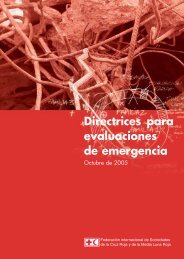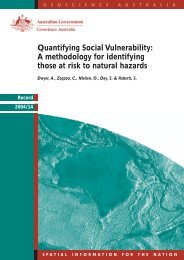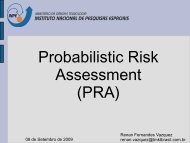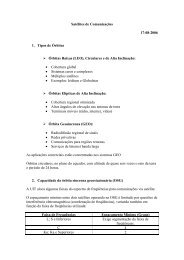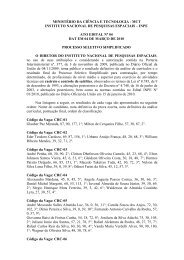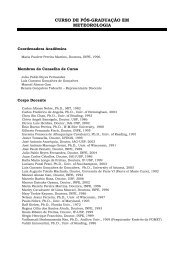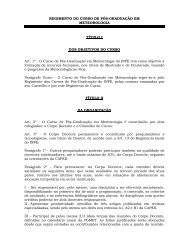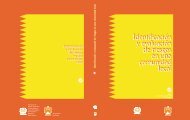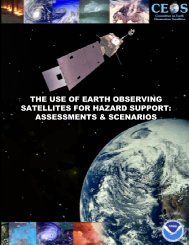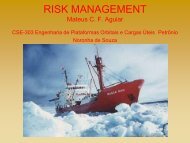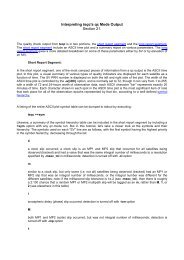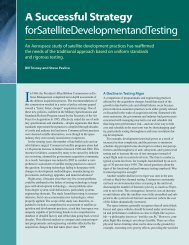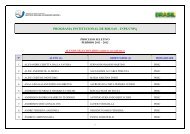Living with Risk. A global review of disaster reduction initiatives
Living with Risk. A global review of disaster reduction initiatives
Living with Risk. A global review of disaster reduction initiatives
Create successful ePaper yourself
Turn your PDF publications into a flip-book with our unique Google optimized e-Paper software.
3<br />
<strong>Living</strong> <strong>with</strong> <strong>Risk</strong>: A <strong>global</strong> <strong>review</strong> <strong>of</strong> <strong>disaster</strong> <strong>reduction</strong> <strong>initiatives</strong><br />
124<br />
Asia<br />
There has been a discernible<br />
growth in the attention to policy<br />
frameworks and structures for<br />
regional collaboration in <strong>disaster</strong><br />
risk <strong>reduction</strong> throughout Asia.<br />
In contrast to some other geographic<br />
regions, such as Latin Americaand the<br />
Caribbean, the regional collaboration in Asia<br />
appears to stem less from the consequences <strong>of</strong><br />
a single devastating <strong>disaster</strong>. Rather it appears<br />
to result more from shared outlooks emerging<br />
from different pr<strong>of</strong>essional interests. In many<br />
<strong>of</strong> the examples <strong>review</strong>ed here, a growing<br />
awareness and involvement <strong>with</strong> broader risk<br />
issues is becoming evident in regional forums<br />
that previously adopted more narrow concepts<br />
<strong>of</strong> crisis and emergency, or in some cases may<br />
not have previously anticipated risk in explicit<br />
terms.<br />
It may be difficult at the present time to identify<br />
a clear and unambiguous approach to <strong>disaster</strong><br />
risk <strong>reduction</strong> among the many cultural,<br />
social, and political distinctions in Asian societies,<br />
but there is nonetheless a clear movement<br />
to identify, and begin to address <strong>disaster</strong> risks.<br />
While <strong>disaster</strong> management agencies are grappling<br />
<strong>with</strong> the changing world before them,<br />
people devoted to other features <strong>of</strong> national<br />
socio-economic development are emerging as<br />
potential allies in reducing <strong>disaster</strong> risk. These<br />
include policy-makers and practitioners<br />
involved in such areas as environmental management,<br />
climate variation, natural resource<br />
utilization, regional planning, the construction<br />
or protection <strong>of</strong> infrastructure, education and<br />
public communications, and public administration.<br />
Over the past two years, a Regional Consultative<br />
Committee on Regional Cooperation in Disaster<br />
Management (RCC) has been convened by the<br />
Asian Disaster Preparedness Center (ADPC)<br />
<strong>with</strong> AusAid’s support, comprising heads <strong>of</strong><br />
national <strong>disaster</strong> management authorities or<br />
<strong>of</strong>fices from 24 countries in Asia. Members<br />
have endorsed the importance <strong>of</strong> the RCC as a<br />
forum to exchange information and experience<br />
regarding national <strong>disaster</strong> risk management<br />
systems. Annual meetings held in 2000 and<br />
2001 have addressed capacity building and<br />
<strong>review</strong>ed experiences <strong>of</strong> new legislation, policy<br />
and institutional reform, and related planning<br />
processes. Both meetings recommended the<br />
wider sharing <strong>of</strong> experiences to enable countries<br />
developing new or modified legislation or<br />
institutional arrangements, to learn from the<br />
experiences <strong>of</strong> others in the region, as well as to<br />
develop <strong>disaster</strong> risk management plans at<br />
national, provincial and local levels. Through<br />
these actions, the RCC has served to consolidate<br />
and strengthen regional and sub-regional<br />
cooperative <strong>initiatives</strong>, even though the various<br />
priorities and interests <strong>of</strong> the countries may<br />
vary.<br />
Specifically, the second <strong>of</strong> these meetings urged<br />
all RCC member countries to adopt a Total<br />
Disaster <strong>Risk</strong> Management Strategy that would<br />
represent “a comprehensive approach to multihazard<br />
<strong>disaster</strong> risk management and <strong>reduction</strong>,<br />
which includes prevention, mitigation and<br />
preparedness in addition to response and<br />
recovery.” Several primary areas <strong>of</strong> action were<br />
identified to advance this approach in coming<br />
years:<br />
• Developing community level programmes<br />
for preparedness and mitigation.<br />
• Building capacity <strong>with</strong>in national <strong>disaster</strong><br />
management systems.<br />
• Promoting cooperation and enhancing the<br />
mutual effectiveness <strong>of</strong> programmes <strong>of</strong><br />
sub-regional mechanisms such as those <strong>of</strong><br />
ASEAN, SAARC, SOPAC, ICIMOD<br />
and MRC.<br />
• Creating awareness and promoting political<br />
commitment through regional <strong>initiatives</strong>.<br />
The third RCC meeting, to be co-hosted by<br />
the Government <strong>of</strong> India in New Delhi in<br />
November 2002, will <strong>review</strong> the progress made<br />
throughout the region.<br />
Information on these <strong>initiatives</strong> and the experiences<br />
<strong>of</strong> several countries in the Asian region<br />
were shared in a regional workshop on legal<br />
and institutional frameworks, and planning for<br />
<strong>disaster</strong> risk management held in April 2002 in<br />
Bangkok. The workshop, organized by ADPC<br />
<strong>with</strong> funding provided by the ECHO,<br />
OFDA/USAID and ADB, provided a venue<br />
to share experiences and discuss issues about<br />
what is working, and what needs to be<br />
improved in the institutionalisation <strong>of</strong> risk<br />
<strong>reduction</strong> efforts. This workshop provided<br />
another opportunity to establish links and to



